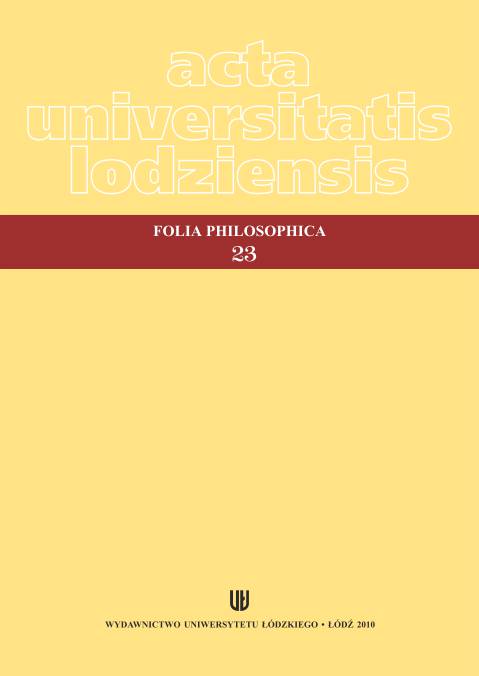Podmiotowość ponowoczesna: wieloznaczność tożsamości czy tożsamość wieloznaczności. Propozycja Zygmunta Baumana
DOI:
https://doi.org/10.18778/0208-6107.23.06Abstrakt
In my research I will try to analyse Zugmunt Bauman reflection about human subject. This author applies rather identity than human subject, but I think we may admit Apple subjectivity instead of identity. Bauman's concept of model personality like a pilgrim on one hand and a stroller, vagabond and player on the other hand, link these categories of human subject. Identity of human subject is continually made "liquid" and has constant potency to change. In consequence, identity is an infinite aimless process because its main determinant – certainty of future connected with values (truth or worth) – are to distort. Does identity in postmodern age is just a wish, which is not realized? Does identity prop on conflict in human existence and never is constant? I will try to go through that and another question and possible answers within Bauman philosophy. In the contemporary debate we see a strong tendency to make a distance to Maxim description. The main problems like truth, subject or knowledge are used in its context. This intellectual climate depends on the basic modernist guidelines. The Cartesian model of cognition especially the strong possibility of cognition is challenged. Lyotard, Foucault, Rorty or Bauman support that tendency.
Bibliografia
Bauman, Z., K. Tester 2003, O pożytkach z wątpliwości. Rozmowy z Zygmuntem Baumanem, (tł. E. Krasińska). Kraków: Wydawnictwo „Sic!”.
Google Scholar
Bauman, Z. 1994, Dwa szkice o moralności ponowoczesnej, Warszawa: Instytut Kultury.
Google Scholar
Bauman, Z. 1995, Wieloznaczność nowoczesna, nowoczesna wieloznaczność. Warszawa: PWN.
Google Scholar
Bauman, Z. 1996, Etyka ponowoczesna. Warszawa: PWN.
Google Scholar
Bauman, Z. 1997, O szansach i pułapkach ponowoczesnego świata, Warszawa: Instytut Kultury.
Google Scholar
Bauman, Z. 1999, Śmierć i nieśmiertelność. O wielości strategii życia, Warszawa: PWN.
Google Scholar
Bauman, Z. 2000, Globalizacja. Warszawa: Państwowy Instytut Wydawniczy.
Google Scholar
Bauman, Z. 2003, Razem osobno. Kraków: Wydawnictwo Literackie.
Google Scholar
Bauman, Z. 2004, Ponowoczesność jako źródło cierpień. Warszawa: Wydawnictwo „Sic!”.
Google Scholar
Bielik-Robson, A. 2000, Inna nowoczesność. Pytania o współczesną formułę duchowości, Kraków: Universitas.
Google Scholar
Habermas, J. 2000, Filozoficzny dyskurs nowoczesności, (tł. M. Łukasiewicz). Kraków: Universitas.
Google Scholar
Kozielecki, J. 1998, Człowiek wielowymiarowy. Kraków: Wydawnictwo Akademickie Żak.
Google Scholar
Lepenies, W. 1996, Niebezpieczne powinowactwo z wyboru, (tł. A. Zeidler). Warszawa: Oficyna Naukowa.
Google Scholar
Marquard, O. 1994, Apologia przypadkowości, (tł. K. Krzemieniowa). Warszawa: Oficyna Naukowa.
Google Scholar
Morawski, S. 1999, Niewdzięczne rysowanie mapy. O postmodernie (izmie) i kryzysie kultury. Toruń: Wydawnictwo Uniwersytetu Mikołaja Kopernika.
Google Scholar
Rorty, R. 1994, Filozofia a zwierciadło natury, (tł. M. Szczubiałka). Warszawa: Aletheia.
Google Scholar
Szahaj, A. 2002, Ironia i Miłość. Neopragmatyzm Richarda Rorty`ego w kontekście sporów o postmodernizm, Wrocław: Wydawnictwo Uniwersytetu Wrocławskiego.
Google Scholar
Środa, M. 2003, Indywidualizm i jego krytycy, Warszawa: Aletheia.
Google Scholar
Pobrania
Opublikowane
Jak cytować
Numer
Dział
Licencja

Praca jest udostępniana na licencji Creative Commons Attribution-NonCommercial-NoDerivatives 3.0 Unported License.












